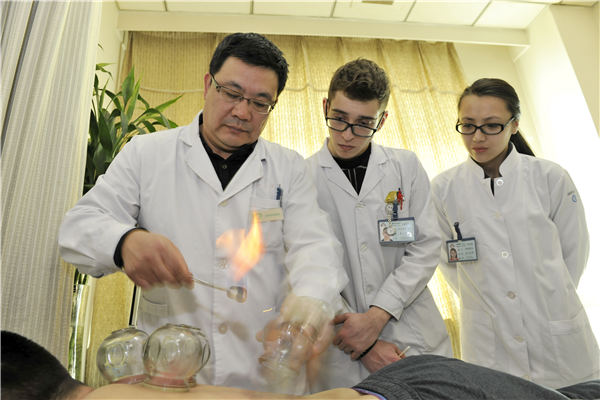TCM prompts more visits from the neighbors


Good results
Halip Abula, director of the Department of Traditional Chinese Medicine at the People's Hospital, said many patients from neighboring countries come to be treated for dermatological, orthopedic and respiratory conditions, which are common in those countries.
"TCM has a very good effect on treating these conditions, which appeals to lots of patients," he said.
Zhou Mingxin, a nationally renowned TCM expert at the Hospital of Traditional Chinese Medicine of the Xinjiang Uygur autonomous region, remembered a patient from Kazakhstan, who came to see him in 2017 for treatment of menstrual cramps.
"Western therapy in her country was ineffective, so she turned to me under the recommendation of her Chinese friends," Zhou recalled.
After conducting the "four steps" of TCM diagnosis - look, listen, question and take the pulse - Zhou concluded that the patient's uterus had "caught a cold" after she swam in cold water during her period. That had led to stasis, which made it difficult for the blood in her uterus to flow out smoothly, causing pain.
Zhou prescribed a number of herbs for the patient and taught her how to make the medicine back home in Kazakhstan. He also asked her to visit him every month to make alterations to the prescription in accordance with the development of the condition.
"For about half a year, she came to see me every month. During that time, her menstrual cramps eased gradually and after six months, the pain had vanished, so she didn't need to come any more."
Zhou was particularly impressed by the case because it helped him to realize that sometimes TCM has better effects on patients from overseas.
"Many patients from other countries are more sensitive to herbs, possibly because they tend to eat more meat and use fewer herbs than Chinese people," he said.
Lu Chen, vice-president of the People's Hospital, one of the best in the region, said that although patients from overseas receive medical services at the same cost as local people, they are not reimbursed in the same way as Chinese patients because medical services in Xinjiang have yet to be connected to the international medical insurance system.
Liu Hongxia, a leading dermatologist at the Hospital of Traditional Chinese Medicine of the Xinjiang Uygur autonomous region, said that in light of that fact, some TCM therapies are especially well-received by patients from overseas because they are relatively inexpensive.
"For example, an effective TCM therapy for psoriasis, a skin condition that is common among patients from Central Asia, consists of guasha (a popular treatment where the patient's neck, chest or back is scraped) and bahuoguan (fire cupping). The entire treatment costs just 30 yuan ($4.50) or so per session," she said.
Online consultation
Duan Yan, deputy director of the Remote Medicine Department at Lu's hospital, said that in addition to providing offline medical services, some hospitals in Xinjiang are trying to expand their scope by setting up transnational medical platforms.
That will allow top experts to offer suggestions, guidance and help for doctors in Central Asian countries via the internet.
"Last year, using this approach, doctors from our hospital offered key advice on the treatment of a woman with a tumor in Kazakhstan, who was unable to visit a doctor in Urumqi," she said, adding that she and her colleagues hope to help more patients from neighboring countries in the future.
Zhang Li, from the hospital affiliated to Xinjiang Medical University, said her institution is working on a platform that will combine online consultations and offline medical services.
A "cloud hospital" transnational medical service network that will connect large hospitals in neighboring countries is also being established, she said.




































